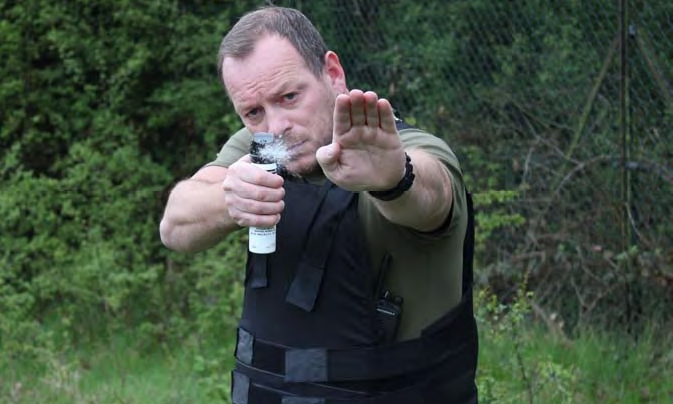Security Apprenticeships vital to counter-terror efforts - By Anthony Rabbitt, Chairman of the Training Providers Section of the British Security Industry Association (BSIA)
 With hightened levels of security across the UK and an ever-present threat of terrorist activity spanning the globe, security training companies are playing an increasingly prevalent role in helping Army personnel to deal appropriately with terrorist incidents and threats. Here, Anthony Rabbitt, Chairman of the Training Providers Section of the British Security Industry Association (BSIA), explores security training courses and how they are aiding the fight against terrorism.
With hightened levels of security across the UK and an ever-present threat of terrorist activity spanning the globe, security training companies are playing an increasingly prevalent role in helping Army personnel to deal appropriately with terrorist incidents and threats. Here, Anthony Rabbitt, Chairman of the Training Providers Section of the British Security Industry Association (BSIA), explores security training courses and how they are aiding the fight against terrorism.
Counter terrorism training is of growing importance within the security industry, but training providers are also actively involved in training the British Armed Forces, through a programme of apprenticeships and courses designed to educate service personnel in the fight against terrorism.
This Apprenticeship in Security programme has enabled individual infantry soldiers to achieve recognised and relevant qualifications, which not only meet the stringent requirements of the National Qualifications and Credits Framework but also the Security Industry Authority. Because certification is not required to perform counter terrorist tasks during operations, the British Technology Education Council Certificate and complementary National Vocational Qualification are designed, developed and delivered by civilian trainer/assessors possessing significant experience both from military operations and commercial security appointments.
As part of the programme, all infantry apprentices are required to demonstrate mastery of the following core knowledge-based units: Working in the Private Security Industry, Working as a Private Security Officer and Communication and Conflict Management, demonstrating the relevance that private security experience can have in the wider context of defence and national security roles.
Learning to demonstrate competent performance for the NVQ builds on knowledge and experience that the learner will have gained from taking part in counter-terrorist operations from training exercises, but is contextualised and orientated to the civilian environment. The syllabus – approved by UK sector skills body for the private security industry, Skills for Security – covers a range of activities involved in counter-terrorism roles, including searching people and vehicles, planning, briefing and conducting security patrols, capturing and recording information, preserving evidence and scenes of crime, heightening situational awareness, against a constant backdrop of deterring criminals and potential terrorist activity.

The Army has long been in the vanguard of the United Kingdom’s counter terrorism operations. Historically, infantry soldiers were the eyes and ears of the civil authorities in Northern Ireland, supporting the police, while further overseas, infantry soldiers have been involved in many counter terrorist or counter-insurgency operations, including in Malaysia, Palestine and, more recently, Afghanistan. Operation HERRICK – the code name given to British operations in Afghanistan – has been a protracted campaign against well-organised paramilitary terrorist groups and now, 12 years on from the advent of British involvement in the region’s conflict, British military units are counted amongst the best in the world when it comes to counter terrorist operations.
Infantry training has evolved to encompass counter terrorism, along with a broad range of other security tasks, including security of personnel, equipment and physical key points, manning vehicle check points, controlling access or dealing with improvised explosive devices. However, the Apprenticeship is a route through which infantry soldiers are able to achieve national recognition of the knowledge gained through training and the skills developed during operations.
The Apprenticeship in Security enhances infantry personnel’s ability to perform counter terrorist operations and provides commanders with soldiers who are flexible and versatile in dealing with the constantly changing situations generated in a fluid and developing theatre of operations. It also provides a solid foundation and understanding of the requirements of working in the commercial security industry at the end of military service.
Looking beyond an armed forces career, the Apprenticeship in Security can also benefit soldiers making the move to civilian life. In a recent survey carried out by the BSIA, 92.6% of respondents reported that ex-forces personnel make suitable candidates for careers within the security sector, with 88.2% of respondents already have ex-armed forces personnel working within their organisations. Several Apprenticeship in Security alumni have, in fact, used the qualification to complement their military experience and make the move into a career in the private security sector.
Of course, the Apprenticeship is the first rung up the lifelong learning ladder and many soldiers, having been promoted as non-commissioned officers, warrant officers or officers seek out and achieve higher level qualifications, as part of their personal development, in managing and planning security.
Afghanistan
 Other companies getting on board with such schemes include another BSIA member company, Optima Defence and Security Limited. Optima Group was the first UK contractor to design and deliver training on the use of a new hand-held IED detector to front line soldiers in Afghanistan, where tight operational timescales required that the training be delivered in-theatre (at Camp Bastion) over a 10-week period.
Other companies getting on board with such schemes include another BSIA member company, Optima Defence and Security Limited. Optima Group was the first UK contractor to design and deliver training on the use of a new hand-held IED detector to front line soldiers in Afghanistan, where tight operational timescales required that the training be delivered in-theatre (at Camp Bastion) over a 10-week period.
This stringent deadline provided the training provider with just seven weeks to design and validate the three-day course prior to the deployment of the Optima Group Mobile Training Team. At the conclusion of the training delivery window, the company had trained 697 soldiers, 690 of whom qualified as competent operators able to detect lethal IEDs placed in the ground by terrorists.
The IED threat is also of concern to the wider population in the region. Whilst military casualties dominate the headlines, the deadly effects of many IEDs are indiscriminate in nature. According to the Joint IED Defeat Organisation (JIEDDO), between 2010 and 2012, only 36% of global IED targets were military; the remainder were a combination of civilian, infrastructure and government. Recent incidents at the Boston Marathon and in the run-up to this year’s Sochi Winter Olympics have highlighted the problem on the global stage.
With the Government’s official terror threat level for Mainland Britain remaining at substantial – meaning that an attack is a strong possibility – the need for training in identifying, deterring and responding to terrorist threats and incidents is just as important for defence and security personnel working in the UK, as it is for their colleagues engaged in combat or military operations overseas.
Choosing a training provider with the appropriate qualifications and experience to deliver counter-terror training courses can be challenging for any company looking to improve its employees’ knowledge of counter-terror operations. BSIA member companies are vetted to a high standard and meet minimum quality criteria, and a full list of members, along with more information about the BSIA and its Training Providers section, can be found at www.bsia.co.uk/training-providers



